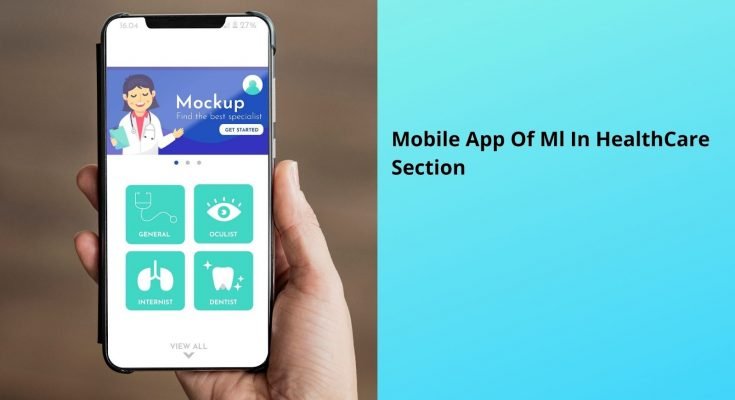Healthcare has gone hi-tech in the past several year’s thanks to mobile health apps and a host of connected healthcare devices. generated plenty of data. The innovative data collection through sensors helped the growth of healthcare technologies. Data-centric technologies Like artificial intelligence (AI) and machine learning (ML) made big inroads in the field of healthcare software development in the past few years through mobile apps.
Machine learning (ML) is continuing to be used across a multitude of scenarios all over the healthcare industry. The efficient implementation of machine learning technology continues to help medical professionals in respect of faster and accurate decision-making, detecting trends, making innovations, and creating scope for better healthcare research.
There are credible statistics to show the huge impact of AI/ML technologies on mobile healthcare apps. The mobile healthcare apps powered by AI and ML technologies are likely to register a growth of $35.892 million by the year 2030 from the current figure of $6.6 billion in 2021. According to the same statistics, a whopping 80% of mobile apps in the healthcare sector will rely on some form of AI.
Understanding the Impact of Machine Learning in Healthcare
In an era ruled by mobile apps and sophisticated digital technologies, the medical industry is continuing to get transformed by innovations, particularly with the advancements in the field of artificial intelligence (AI) and machine learning. These two technologies made it easier for healthcare professionals to get hold of and analyze a huge volume of data for generating predictive insights and delivering treatment.
These days, making use of machine learning technology in the field of healthcare has become much easier as big data platforms like Hadoop are robust and capable enough to allow large-scale adoption at a quick pace. According to the most credible research, the vast majority of service providers are now relying on Hadoop big data tools to generate the most important insights for healthcare practices.
The capabilities of machine learning are also exponentially increasing in detecting data-driven insights and patterns. From generating insights from vital statistics to real-time medical data to advanced data-driven patient insights based on condition, machine learning has made inroads into different healthcare fields for different reasons.
Let’s look at the most important use cases of machine learning (ML) in the healthcare sector.
Better Imaging Techniques
These days doctors mostly rely on different imaging techniques such as MRI, CT scan, and others for diagnosis. In spite of these imaging techniques, manual diagnostics are often subjected to gross human errors. In the case of various internal organs, the slightest misreadings of the images can lead to wrong treatment resulting in death. This is where machine learning technology can help dispel such diagnosis errors.
This advanced ML-based image analysis can also help remote healthcare apps. Particularly for telemedicine app development projects, ML-based imaging can completely eradicate the chances of diagnosis errors and make the process faster and accurate.
Preventing frauds with Health Insurance
Health insurance frauds are common in many countries where submitting misleading or wrong information to claim insurance is common. Often it becomes really challenging for human professionals to detect such frauds and spot certain system errors leading to such fraudulent activities. This is where machine learning algorithms can be very effective in detecting gross anomalies and irregularities indicating fraudulent intents.
For efficient insurance selling also machine learning can be used successfully. By learning about the potential concerns, risk factors, and other parameters, machine learning can help spot the right persons needing medical insurance.
More accurate diagnosis
Apart from using intelligent imaging techniques, in the day-to-day diagnosis of health problems and certain diseases also machine learning can play an important role. In detecting particularly viral diseases and conditions where the fast-paced transformation of the virus is an added threat, the keen observation of patient conditions and medical data is key to accurate diagnosis, and this is one area where Machine Learning can be highly effective.
IBM Watson in its machine learning-based Genomics program facilitated the integration of cognitive computing with the sequencing of tumoral based on the human genome. Since early intervention is crucial for curing certain lethal types of cancers and other diseases, ML-based diagnosis can be tremendously helpful.
Drug Research
One of the key ways machine learning plays a crucial role in the advancement of healthcare is through drug discovery. Today machine learning is use across the major R&D labs of pharmaceutical companies. Machine learning is highly effective in gene-based sequencing and developing precision-driven medicine for specific conditions.
Since drug discovery is slow, time-consuming, and cost-intensive, machine learning can ensure enhanced accuracy without consuming much cost and development time. Microsoft has embraced machine learning technology for its Project Hanover for drug research and critical healthcare. Machine learning is also helping to make personalized treatment plans involving specific combinations of drugs for particular conditions.
More efficient Electronic Health Record (EHR)
The Healthcare industry is overflowed with data of all types. But keeping up-to-date medical records is very important for multiple reasons. To make this tedious process easier, now machine learning is playing a great role. The machine learning technology in the process of maintaining health records is ensuring ease of access and is saving time and resources.
Conclusion
Here we just explained only a handful of ways machine learning is impacting the healthcare sector. Since machine learning presupposes a certain level of data-driven automation, every healthcare service provider in the years to come will likely rely more on this technology. Healthcare apps are also going to use ML more frequently for fulfilling different healthcare needs.




